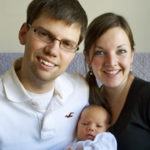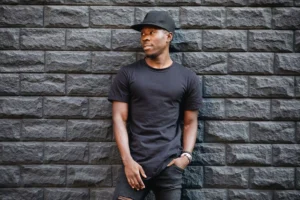I couldn’t help but notice the man on his laptop in the bus seat in front of me as he searched for a date on Match.com. An ad promised help finding “your ultimate woman,” and he seemed intent on doing just that. Scroll up. Scroll down. Click on a thumbnail of a woman with short black hair. Click through her slideshow of pictures. Minimize profile. Back to search. Another profile: “Multicultural physically fit female. Body type: athletic, Kids: maybe, Marital status: never married.” Click through her slideshow. Exit profile. Back again to the search page with rows of women. After doing this for 10 minutes or so, the man, who was probably in his early 30s, went back to watching The Simpsons, pausing it every few minutes to revisit Match.com.
This scene reminded me of Brad, a 30-year-old man I interviewed for a research project this past summer. Brad’s disheveled hair, unshaven face and hollow, dazed eyes betrayed a young man still trying to find himself, not content to just have the middle-class lifestyle with the white picket fence, nice home, wife and 2.3 kids. Running his hand through his thick black hair, Brad wondered aloud, “How do I know that I’ve found the right person?” He peered around the corner to make sure his girlfriend who was waiting for him at another table was out of earshot before adding, “If you lined up 1,000 girls in front of me, I’m sure I could pick 500.”
In a world of increasing options — where it’s just as conceivable that you could marry someone from Iceland as it is that you’ll marry someone from your hometown — how’s a man (or woman) to choose?
The Paradox of Choice
In The Paradox of Choice: Why More is Less, psychologist Barry Schwartz sheds some light on why it may be so difficult to choose a marriage partner today. He notes that in the modern West it’s a tenet of orthodoxy that more choices equal more happiness. But Schwartz argues that while choice is good, at a certain point too much choice makes choice difficult, and thus even when we do decide, robs us of satisfaction. Bewildered by an array of choices, we become paralyzed, unable to make a decision. If we do make a choice, we find ourselves constantly wondering, What if?
To illustrate his argument, Schwartz tells of a series of studies titled “When Choice is Demotivating.” He explains:
One study was set in a gourmet food store in an upscale community where, on weekends, the owners commonly set up sample tables of new items. When researchers set up a display featuring a line of exotic, high-quality jams, customers who came by could taste samples, and they were given a coupon for a dollar off if they bought a jar. In one condition of the study, six varieties of the jam were available for tasting. In another, 24 varieties were available. In either case, the entire set of 24 varieties was available for purchase. The large array of jams attracted more people to the table than the small array, though in both cases people tasted about the same number of jams on average. When it came to buying, however, a huge difference became evident. Thirty percent of the people exposed to the small array of jams actually bought a jar; only 3 percent of those exposed to the large array of jams did so [emphasis mine].
The point is that when we are confronted with an overwhelming number of choices, we become indecisive and often don’t decide at all. That is the paradox of choice. The paradox is that while choice is supposed to liberate us, at a certain point, too much choice can actually tyrannize us.
Marriage as the Paradox of Gift
In a world of multiplying options, how can we escape this trap when it comes to choosing a spouse?
It’s a hard question, one that I’ve wrestled with more than one conflicted friend (and with my wife before we were married). I think the most important thing we could do when afflicted with this question is to pause and engage a deep philosophical and theological question: “What is the meaning of marriage?” What is the whole point of this momentous choice that we agonize over? What is this choice for?
Reflecting on the mystery of marriage may not make it absolutely clear whom we’re supposed to marry, but it can give us the bird’s eye view of what marriage is and in so doing, can ensure that we are at least headed in the right direction when it comes to choosing a spouse.
An analogy might help make this point: Sometimes when we are in the middle of a difficult life choice — about where to go to college, what job to take, etc. — we wish that God would answer our prayers in an unmistakable, audible voice. Yet this rarely happens. Instead, often what is needed is for us to back up and look at the big picture — to reflect on God’s character and to remember the purpose of school or work or whatever it is that we might be so conflicted about. Similarly, when mired in uncertainty about choosing a spouse, one of the best things to do is to step back and ponder the meaning and purpose of marriage — and to then let this understanding inform one’s decision of whom to marry.
So, taking a step back for a moment, let’s ask: What is marriage?
In contemporary culture, there are at least two competing worldviews of what marriage is: the consumer understanding of marriage as primarily about individual fulfillment and the Christian understanding of marriage as the gift of self.
First, let’s look at the consumer understanding. As one of America’s top marriage therapists, William Doherty notes the market model has increasingly invaded every sphere of life — including marriage. Whether it’s at work, church or marriage, Doherty suggests that “[i]n a generation we have moved rapidly from being citizens to being primarily consumers.” In other words, we’ve moved from being citizens of marriage who ask, “What can I do for my marriage?” to being consumers of marriage who ask, “What can marriage do for me?” The problem, as Doherty notes, is that consumers are inherently disloyal which is why it’s so rare for us to stay at one job for a long time or even to stay in one church for a long time. When one takes that consumer attitude into marriage, the consequences are pernicious. Instead of asking how he is called to sacrifice, he says “I deserve better.”
The consumer understanding of marriage distorts what marriage is really about: a gift of self. Marriage isn’t a supermarket of goods, ready-made for our consumption. If the supermarket down the street stops selling our favorite ice cream, no problem. We buy ice cream at another supermarket. But marriage is a vocation more rigorous — and more heroic — than that of the consumer. It’s more like a garden that calls us to pick up a spade, get our hands dirty and — after much patience and persistence — to enjoy the fruit of our labor. Even then, with growing a garden, sometimes crops wither. But it doesn’t mean we abandon the garden. It just means we plant the seeds again and keep tending the garden.
In the same way, marriage isn’t necessarily a ticket to our own version of individual fulfillment. What if your future wife becomes severely paralyzed? What if your child has Down syndrome? I suspect we have not adequately wrapped our minds around the meaning of marriage until we have considered the possibility that at any moment, whether during the honeymoon or in mid-life or in old age, tragic circumstances could call us to give up almost everything — our dream career, our comfort, our “happiness” — for the sake of the beloved. Marriage makes heroes, not consumers.
Marriage is heroic in that it calls a man and woman to give the gift of “I” — a gift so radical that it constrains our choice, but also so creative that it creates a “we” (the one-flesh marriage union) and other little “I’s” (children!). The decision of marriage at once narrows the horizons (you can’t marry anyone else) and extraordinarily expands them (you raise your own family).
In other words, in marriage, we discover another paradox: the paradox of gift. The paradox is that in giving the ultimate gift (our self), we gain what humans throughout the centuries have described as “the meaning of life” (the love of one’s spouse and children). When it would seem that we lose ourselves, we find ourselves. Not only do we spiritually “find ourselves,” but we also physically find a reflection of ourselves in the children that come from the marriage union. As John Paul II said, “The lover ‘goes outside’ the self to find a fuller existence in another.”
This paradox of gift stands in direct contrast to the consumer understanding of marriage, which so easily lends itself to the paradox of choice.
From Consumer to Lover
When our view of marriage shifts from a consumer understanding to an understanding of marriage as the paradox of gift (as something that is in essence about sacrificial love and giving oneself to another), we build up immunity to the dizzying effects of the paradox of choice. And I can’t prove this, but my hunch is that it becomes easier to choose whom to marry.
How? Because the mystery of marriage invites us to adopt a particular orientation in dating, a way of discovering the person — their unique personality, life dreams, character, quirks — that does not reduce the person to a means to our own fulfillment, but encounters those qualities in “Ryan” or “Ashley,” a distinct person who is an end. Rather than primarily seeing Ashley as a way for me to feel good about myself, I see her as a person with whom I can share my life. As John Paul II says in Love and Responsibility, “There must be a direct attraction to the person.” He goes on to say that that attraction cannot be merely a response to “particular qualities” in the person, but must also include a deep awareness of the person — that the beloved cannot be “merely attractive because of certain qualities which he or she possesses.” In other words, Ryan may appreciate that Ashley is a deep thinker and creative musician — but he is attracted to Ashley, a unique and unrepeatable person who possesses these qualities; he is not merely attracted to the qualities of deep thinking and creativity, which happen to reside in Ashley. Ryan’s attraction must be ordered to the unique and unrepeatable Ashley — and not merely toward particular qualities that he likes in her.
And when I am attracted to the person of Ashley, rather than her constituent qualities, I do not think of Ashley as one attractive woman out of a long list of 500 whose profiles are flashing before me on Match.com. It may be true that there are thousands of women in the world with whom I could be happy. But rather than dwell on that fact and worry about whether or not I have chosen the best possible option (which is a terrifyingly paralyzing task that would take a lifetime to figure out), I can remember what marriage is — a heroic act of self-gift. I can spend less time second-guessing the relationship, because I have discovered Ashley as a person — her unique personality, life dreams, character, quirks.
This does not mean we blindly give ourselves to whomever walks down the street. Again, marriage calls us to discover the other person. And that process of discovery may involve asking difficult questions about the truth of the other person: “Has Ashley indicated by her character that she will respect the integrity of what marriage is and love me for better or worse, for richer or poorer, until death do us part?” “Has she demonstrated by her conduct that she will be a loving mother to our children?” There is a subtle — yet vast — difference between a discernment that asks, “Will she be a loving wife and mother?” and “Will she make me happy?” The former is a discernment focused on the objective truth about the other person, whereas the latter is a discernment focused on how she makes me subjectively feel. Lovers should ask hard questions of each other and of themselves. But, again, that’s all a part of discovering a person — a person who is an end, not a means to our own happiness.
There’s a difference between a consumer who is looking to use a person for his own end and a lover who is seeking to discover the beloved. A consumer evaluates his options; a lover woos his beloved. A consumer considers the trade-offs of not choosing Jennifer in favor of Ashley; a lover just looks into the eyes of his beloved and asks, “Ashley, will you marry me?” A consumer is enticed then carefully calculates; a lover is bewitched then ardently pursues. A consumer shops, seeking the best deal; a lover discerns, seeking to know the other person.
In courting and choosing whom to marry, we would do well to focus on the person and to remind ourselves that marriage is about giving ourselves in love to another person, and not primarily about individual fulfillment. Marriage rescues us from the paradox of choice and introduces us to the paradox of gift: Give yourself, and you find yourself. Focus on your needs, your happiness, your desires, and you get neither fulfillment of your needs, happiness, nor desires. Give yourself unreservedly to your beloved, and you discover the meaning of life.
Copyright 2011 David Lapp. All rights reserved.










